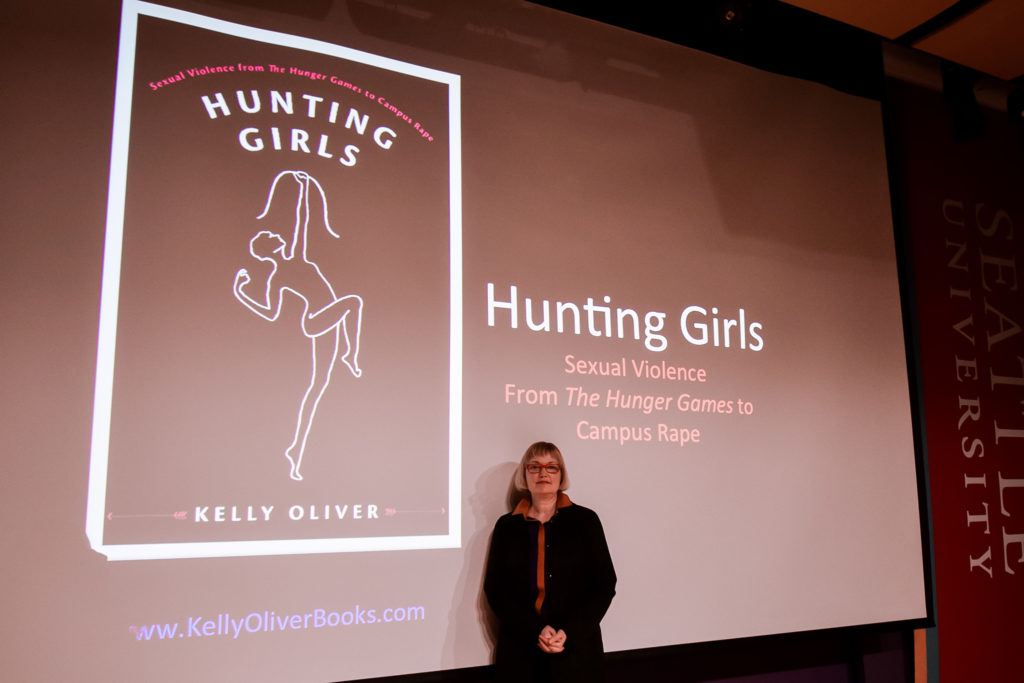“Women have been using Title IX which, for all its problems, has been instrumental in fighting against schools and the very institutions that help to foster a culture that is complicit and in some cases even encourages sexual assault against women.”
This comes from a talk in Piggott Auditorium this week given by Kelly Oliver, a Philosophy Professor from Vanderbilt University who wrote the book, “Hunting Girls: Sexual Violence from The Hunger Games to Campus Rape.” Oliver was inspired to write this as a peek into how the portrayal of women in media affects sexual assault and rape culture.
The talk was put on by Seattle University’s philosophy department as a part of an annual event wherein they invited an esteemed philosophy professor from another school to give a talk about a subject of their choosing.

Kelly Oliver, former SU professor and acclaimed author, speaks about the valoratization of rape and sexual assault on college campuses.
As a part of her talk, Oliver analyzed the relationship between the treatment of leading female characters in literature and film and how they both positively and negatively impact feminist identity. She detailed how in today’s society there are more role models for girls than ever before. She specifically referenced Katniss Everdeen from “The Hunger Games” and Tris from “Divergent.” These characters are portrayed as strong and independent and are a positive step forward in some ways, but are by no means free from the pitfalls other fictional females have long been accustomed to, including being sexualized.
Oliver argued that scenes where female leads are attacked, and especially scenes where they are choked, lead to the normalization of these acts in society and can contribute to a culture where assault is normalized and has even in some cases been seen as preferrable to consensual interactions.
Because part of Oliver’s reason for writing her book was to help bring attention to violence towards women on her college’s campus, she spoke about violence on universities. More specifically, she spoke about assaults that happen at fraternities and said they are a result of a culture that exists in some of these groups that does not value women.
Oliver presented a series of cases from college fraternities across the country in which fraternities hung signs and chanted about raping women. Fraternity members said that not only are they going to assault women but that they do not even want consent.
Another big focus of her presentation about sexual assault on campuses was her detailing the idea of fraternity members who did not view themselves as rapists because they targeted women who were unconscious or semi-conscious by drugs or alcohol, rather than physically restraining women.
“According to a study, 32 percent of men say that they might rape a woman if they knew they could get away with it,” Oliver said. “Half of the men surveyed said that they would use sexual aggression or drugs to force a woman into having sex with them. The real issue is the 20 odd percent who do not recognize that what they are doing is rape.”
The main focus of Oliver’s talk was how all types of media contribute to sexual assault and part of her presentation focused on how social media was impacting sexual assault. One of the big changes that Oliver said we have seen in recent years is that videos of the assault taken by bystanders or perpetrators are more common and are even shared on social media.
April is Sexual Assault Awareness Month, and during the course of the month, there will be events and talks for students to better educate themselves on sexual assault. At Seattle U there will be a specific focus on assault that happens on college campuses and what people can do to prevent it and provide support for survivors of assault. This will include events like Take Back the Night and Green Dot training to help support and help students that face abuse.
Logan may be reached at
lgilbert@su-spectator.com







